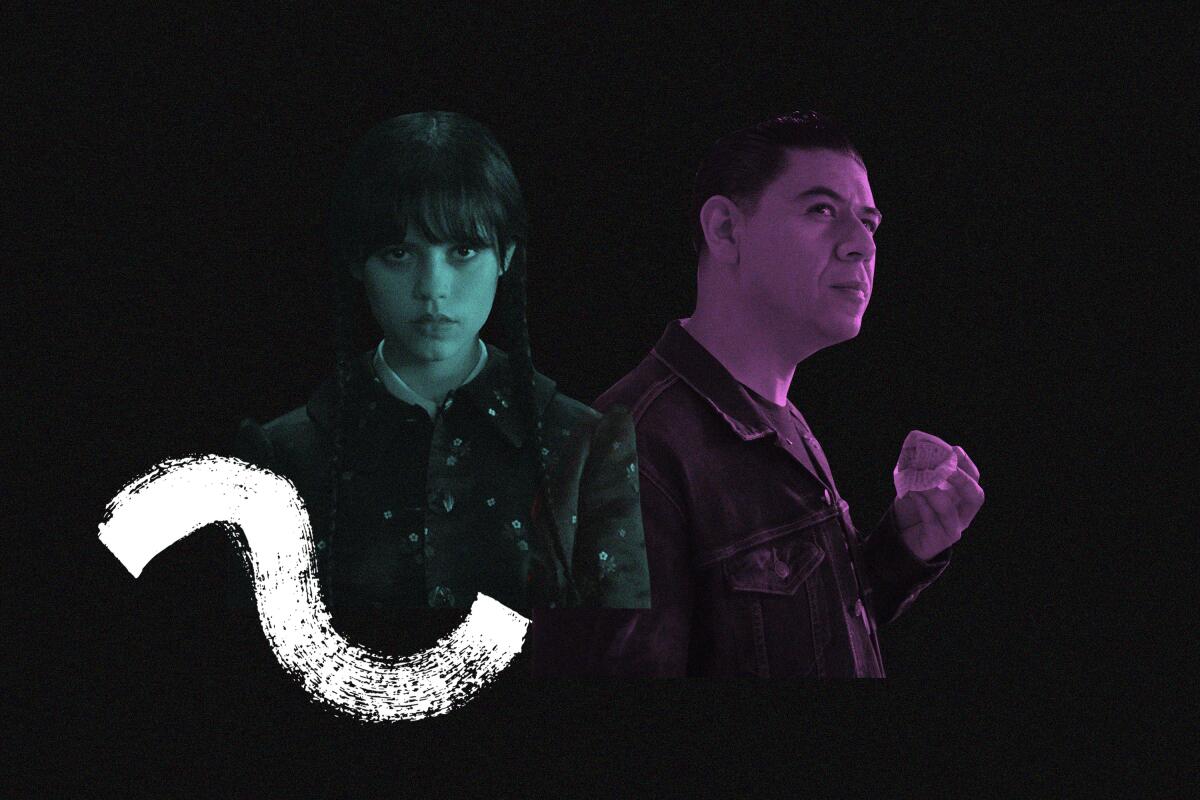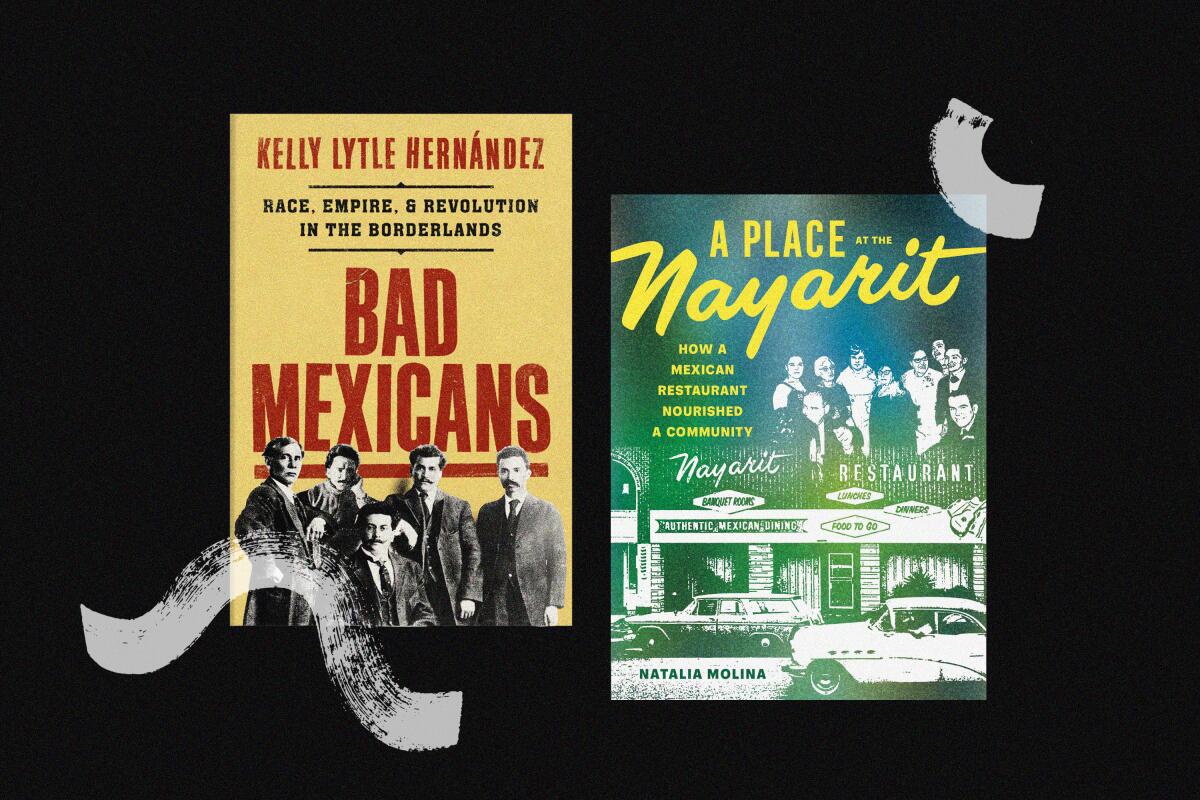Latinx Files: Our favorite TV shows, movies and books of 2022

In last week’s Latinx Files, we recapped our favorite albums and podcasts of 2022. This week, it’s all about television, film and books.
Without further ado, here are more things we enjoyed. A quick note, I’ve bundled television and movies into the same category because Hollywood still has an aversion to putting Latinxs in front and behind the camera. Here’s hoping they do better in 2023.

Television/Film
‘This Fool’ (Hulu)
There’s a sequence from the Hulu comedy series “This Fool” that lives rent-free in my head. It’s the opening scene of the “Los Botes” episode, and in it we see Esperanza (Laura Patalano) navigating her custodial job at an office building with complete invisibility. She’s there but the white-collar office workers don’t see her, which gives her the perfect cover to steal office supplies — and the episode its premise. What struck me about this sequence is that it portrayed Esperanza as having actual depth. Yes, she’s a hardworking immigrant whose physical labor gave her children a chance at a better life — whether they made the best of it is debatable. But she’s also a thief. In other words, she’s a human being with flaws.
That’s what’s great about “This Fool.” It eschews the after-school special vibe that’s plagued much of the Latinx-centric television content that came before it in favor of presenting an honest portrayal of a working-class Mexican American family in South Los Angeles. It’s smart, thoughtful and very funny. Stupidly so.
‘Wednesday’ (Netflix)
I didn’t expect to enjoy this murder mystery of a teen dramedy as much as I did, but here we are. The Netflix series focuses on Wednesday (played by Coachella Valley native Jenna Ortega), the eldest child of the Adams Family sent off to Nevermore Academy, a private school for the supernaturally elite. But something’s not right — a mysterious monster appears to be targeting and killing Nevermore students, threatening to undo the fraught relationship between the school and the small town that seemingly exists to cater to it.
What I loved about “Wednesday” — besides the fact that it was easily digestible, fun television — was how the show embraced that the Addams family is Latinx without being over-the-top cringey about it. There were no long, cliche soliloquies about being their ancestors’ wildest dreams. Instead, we got a sardonic niña dark with a healthy love of the macabre, great taste in music (Chavela Vargas on the soundtrack? You love to hear it!) and a terse and complicated relationship with her mother. If that doesn’t scream Latina to you, I don’t know what does.
On a related side note, was I hallucinating or did the Goody Addams character speak in a hilarious Speedy Gonzales accent?
The Latinx experience chronicled
Get the Latinx Files newsletter for stories that capture the multitudes within our communities.
You may occasionally receive promotional content from the Los Angeles Times.
‘Andor’ (Disney+)
It’s hard to believe that Disney, which is more Galactic Empire than Rebel Alliance (I still haven’t forgotten how it tried to trademark “Día de los Muertos” in 2013), would put out something so transgressive as “Andor.” But that’s exactly what the Mouse did.
A prequel to “Rogue One” — the best “Star Wars” movie, don’t at me — the series follows the political radicalization of its titular character, Cassian Andor (played by Diego “El Rudo” Luna). What makes “Andor” stand out (and “Rogue One,” for that matter) from the other “Star Wars” series is that there are no Jedis involved. Rather, the appeal is watching ordinary people get to a point where they feel emboldened enough to do extraordinary things. As my colleague Matt Pearce rightly points out in this thoughtful roundtable about the show, “the most iconic weapon in ‘Andor’ isn’t a lightsaber, it’s a brick.”
‘Black Panther: Wakanda Forever’
Personally, I thought the much-anticipated Marvel sequel was clunky — understandable given that the franchise lost its star in 2020 when Chadwick Boseman died unexpectedly of cancer, which resulted in a complete overhaul of the movie’s plot.
Despite its unwieldiness, director Ryan Coogler will forever be invited to the carne asada for giving us Namor, a Latin American and Indigenous super being in the Marvel Cinematic Universe worthy of his own film. Mexican actor Tenoch Huerta plays the ocean king to perfection, setting an impossibly high bar for upcoming Latinx-centric superhero movies “El Muerto” and “Blue Beetle.” More important, Huerta has used his newly acquired massive platform to call out colorism in Latin American media, going as far as claiming that Mexican television gives the impression that Mexico is whiter than a Scandinavian country.
‘What We Leave Behind’ (Netflix)/ ‘Beba’ (Hulu)
In my opinion, some of the best Latinx work in film right now is being done in the documentary space.
Take “What We Leave Behind.” In it, director Iliana Sosa follows her grandfather Julian Moreno, an 89-year-old former bracero, back home to his rural town in the Mexican state of Durango after visiting his children on the U.S. side of the border for the last time. Once back in Primo de Verdad, Moreno begins construction of a house for his children that’s next to his for when they come home.
There’s also “Beba.” Written, directed and produced by Rebeca Huntt, the film is more personal essay than documentary. It’s a self-portrait of an Afro Latina woman who moves back in with her parents after going to Bard College, and the tensions and trauma that exist between immigrants (Huntt’s mother is from Venezuela and her father is from the Dominican Republic) and their children. What struck me about these two short documentaries (both are a little over an hour long) is how heavily they lean into their humanity. It’s messy at times, sure, but never clinical and dispassionate.
Other staff picks
“Wednesday.” Every episode is a whodoneit. My husband and I watched it with our 9- and 11-year-old children. It had the right amount of scariness for the kids and it’s funny. A goth Latina on screen and sprinkles of Latinidad was a bonus.
—Susana Sanchez, art director
“This Fool” is the rare Mexican American-led show that doesn’t pander. It felt like a genuine representation of a slice of our culture mixed with some over-the-top humor. Selena Gomez in “Only Murders in the Building,” “Selena + Chef” and the “Peek at Pico” sketch on Saturday Night Live continues to own her Mexican American roots and use her growing platform to slip in salutes to it. During this season of “Only Murders in the Building,” a painting by her character featured on the show was a call back to Frida Kahlo; on her cooking show she talks frequently about her Mexican grandmother’s cooking; and “Peek at Pico” was the funniest sketch on SNL in 2022.
—Iliana Limón Romero, sports editor
Consider subscribing to the Los Angeles Times
Your support helps us deliver the news that matters most. Become a subscriber.

Books
‘Bad Mexicans: Race, Empire, and Revolution in the Borderlands,’ by Kelly Lytle Hernández.
I can’t think of a book that I’ve recommended more to people this year than “Bad Mexicans,” the latest book from historian and MacArthur Fellow Kelly Lytle Hernández that tells the story of the magonistas, a group of anarchist and socialist rebels who helped spark the Mexican Revolution from the United States. It is a deeply researched historical account that reads like a novel — as I wrote in the newsletter back in June, there are portions of the book that are so outlandish you’d swear they were fabricated if it weren’t for the fact that Lytle Hernández shows the receipts.
“Bad Mexicans” also makes the very compelling argument that the histories of Mexico and the U.S. have been intertwined for nearly two centuries and you can’t truthfully tell the story of one country without also bringing up its neighbor.
‘A Place at the Nayarit,’ by Natalia Molina
My takeaway from reading “A Place at the Nayarit,” by historian and MacArthur Fellow (not to mention LA Vanguardia honoree) Natalia Molina, is that a particular space can mean so much to so many people.
That’s exactly what the Nayarit was, a Mexican restaurant in Echo Park opened in 1951 by Doña Natalia Barraza, Molina’s maternal grandmother. Over the course of two decades, the Mexican restaurant served as a safe space for a slew of communities, whether these be Mexican expats looking for a “patria chica” — a home away from home in Los Angeles — or queer Angelenos looking for a place where they wouldn’t be harassed.
‘Olga Dies Dreaming,’ by Xochitl Gonzalez
Imagine being an Ivy League graduate and owner of your own successful business, but in the eyes of your mother you and your congressman of a brother are massive disappointments. This is the central conflict of “Olga Dies Dreaming,” the impressive debut novel by Xochitl Gonzalez.
Set in the months before Hurricane Maria devastated Puerto Rico in 2017, the book is a tale of the past coming back to haunt in the form of an unkind and unforgiving parent who has resurfaced with an agenda. “Olga Dies Dreaming” also explores the topics of race, wealth and class, and how these factor into gentrification and colonization.
Gonzalez also writes the “Brooklyn, Everywhere” newsletter for the Atlantic, which is also very good. You can find that here.
‘How Not to Drown in a Glass of Water’ by Angie Cruz
While reading “How Not to Drown in a Glass of Water,” the fourth novel by Angie Cruz, I couldn’t shake the feeling that I was secretly listening in on someone baring their heart and soul to their therapist. That’s because I was, in a way.
It’s 2009, the height of the Great Recession, and Cara Romero has lost her factory job after working there for more than a quarter of a century. In order to keep the unemployment benefits that are keeping her afloat, Cara, an immigrant from the Dominican Republic in her mid-50s, is forced to see a career counselor. Over the course of 12 sessions, Cara undrowns and lets it all out — all the mess and drama, all the love affairs and heartbreak.
Other staff picks
Manuel Muñoz’s exquisite collection of short stories, “The Consequences,” is inspired by his upbringing in the Central Valley. What an absolutely brilliant writer.
— Carolina Miranda, columnist
“The Abduction.” Shea Serrano has added another surprising and engaging story to his self-published collection. His voice is so relatable and he has mastered a mix of humor and suspense in each piece. Shea left The Ringer recently to focus more on his own work and development of a scripted series based on his life. Can’t wait to see his next work.
— Iliana Limón Romero, sports editor
The Latinx experience chronicled
Get the Latinx Files newsletter for stories that capture the multitudes within our communities.
You may occasionally receive promotional content from the Los Angeles Times.




